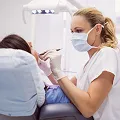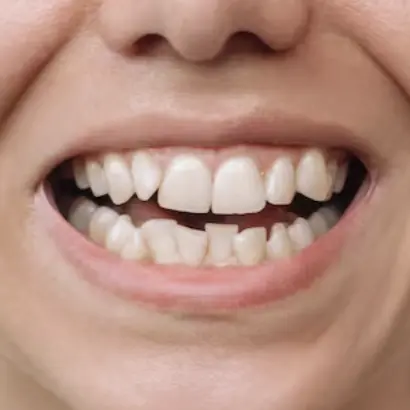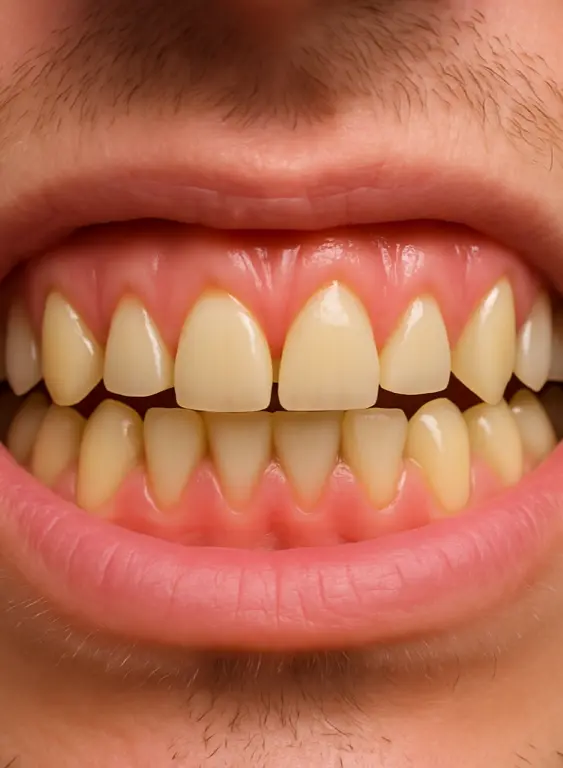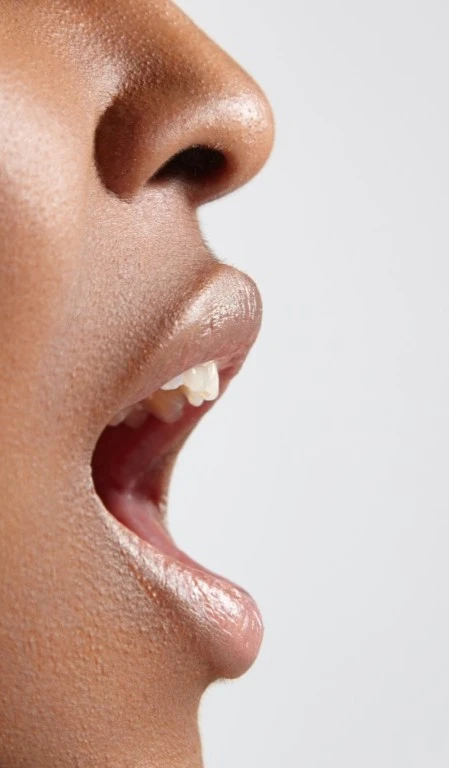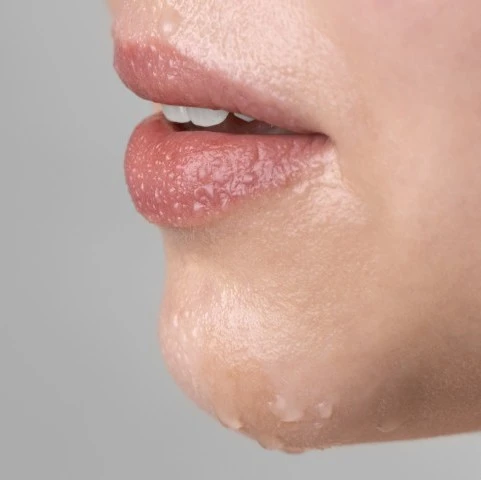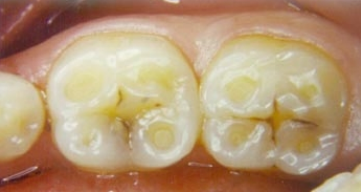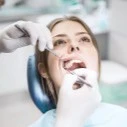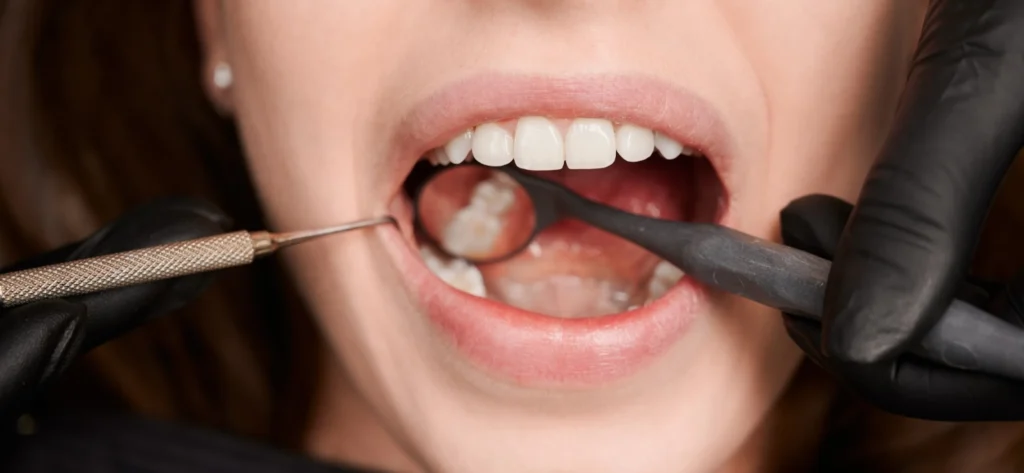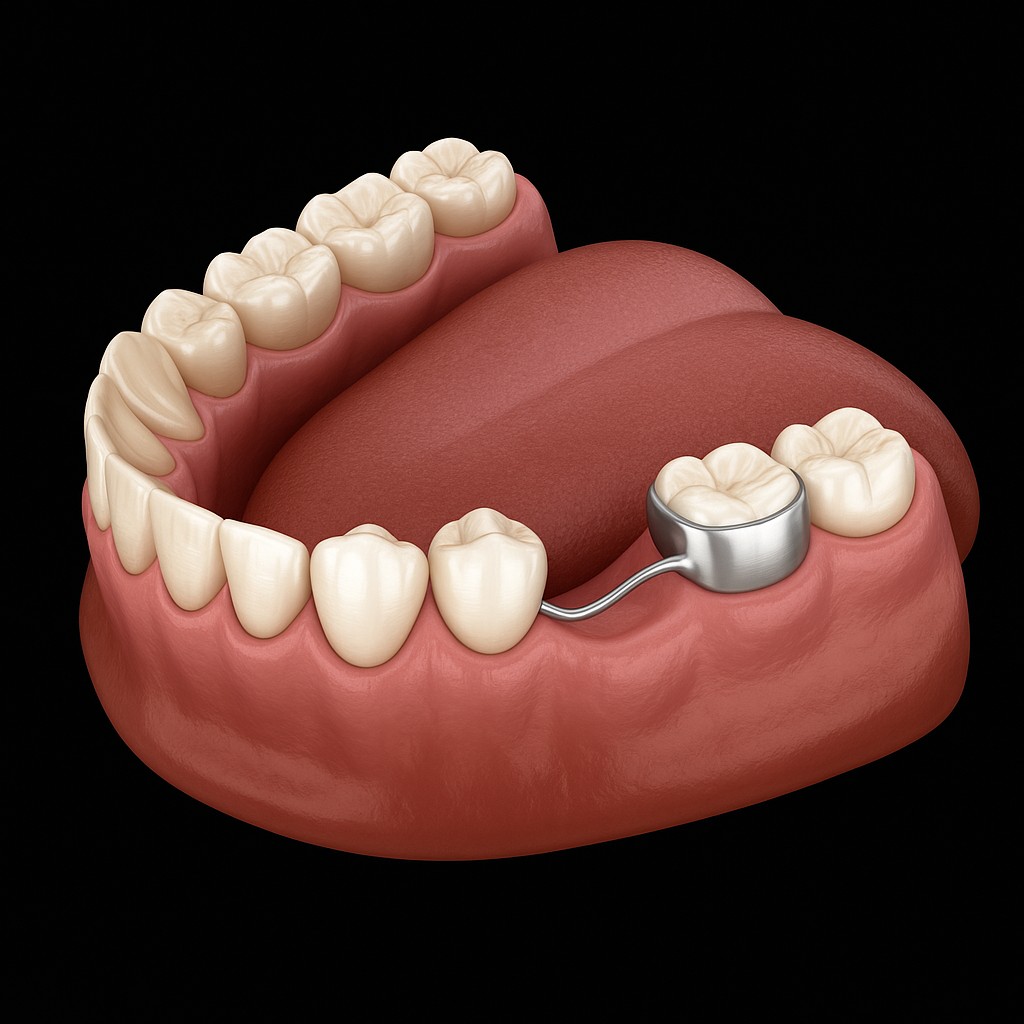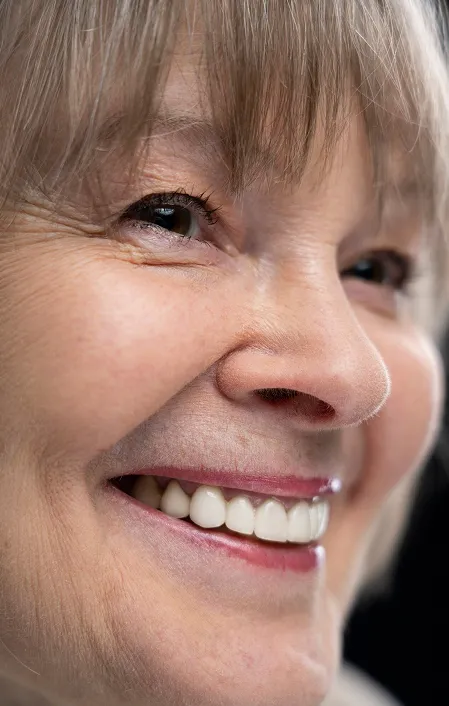
What are Dentures?
Dentures which are sometimes referred to as ‘teeth plates’ are removable false teeth to replace missing ones. They are an easy and economical way to replace just one or multiple missing teeth. Almost everyone is suitable for dentures and they usually require little or no adjustment to the existing teeth and gum.
Different types of dentures:
Full Dentures*
- You are missing all your teeth in the upper and/or lower arch and require a full replacement set of fake teeth.
- *Please note we do not do Full Dentures at our clinic and may have to refer you on for this.
Partial Dentures
A Partial Denture is used to replace missing teeth where there is at least one tooth left in the arch. There are different types of Partial Dentures – please read below to find out more
Partial Cobalt Chrome
The best long-term option. The metal base allows it to be much thinner than the other options with hooks around the teeth to retain it.
Partial Acrylic
Sometimes used as a temporary option and is usually quite bulky because it is made of Acrylic Resin with wire hooks around teeth to retain it.
Partial Flexible
Also known as ‘Valplast Dentures‘, are not usually recommended as it is really detrimental for your gum health. This is a Denture that relies on tightness around the gums to hold it in.
Implant Retained
False teeth that are clicked into a Dental Implant that has been surgically placed into the jawbone. The Dental Implant itself is not removable but the Denture that fits on top is removable.
Signs you might need a Teeth plate:
Not all missing teeth need to be replaced. It depends on many factors such as the location of the missing tooth, the bite, and the health of the other teeth.
Most of the time, teeth plates are a good option if you are missing multiple teeth, not just a single tooth. The more natural teeth you have though, the better the fit of the Partial Denture.
Full Dentures can be difficult to retain especially if you have lost a lot of bone. Full Upper Dentures rely on the suction from covering the root of your mouth (palate) whereas it is difficult to get the same suction for a Lower Full Denture.
Luckily now there are better options to Dentures, such as Dental Implants but Dentures are still an option if Dental Implants are not an option due to medical reasons or due to financial constraints.

How are Dentures made?
Dentures vary in terms of steps depending on the type of Denture and the number of teeth.
Traditionally the method would involve (especially for Full Dentures):
- Taking a First Impression to get a model of the teeth / arch.
- Taking a Secondary Impression with a form fitting tray that is made from the model above.
- Bite registration – a rim constructed of wax is made to measure your bite.
- Try in – false teeth are set up in the wax and tried in- this is where the Dental Professional and yourself can review the look and feel of the fake teeth and make any adjustments
- Further Try ins if required- if there were many changes made, then a further Try-in is recommended
- Insert – this is when the final denture is inserted
Nowadays with 3D dental scanning technology, the steps are much more streamlined and you will not need as many appointments. Here at Dental at Keys, we are delighted to offer 3D scanning technology as a fantastic tool to decrease the treatment time required to obtain your new tooth plate.
Note: This is case dependent and your Dental Professional will be able to guide what’s best for you.
Denture maintenance
It is a common misconception that once dentures are made – no maintenance is required. Dentures, in-fact, require regular reviews to check the fit against the gums and/or teeth. Ill-fitting dentures may cause ulcerations and gum recession.
Dentures need to be cleaned professionally at least one or twice a year – as they too collect calculus (tartar) just like teeth in the mouth. Fortunately this can be done with the dentures outside of your mouth!
The fitting surfaces of the dentures may need to be re-lined every few years to ensure a proper fit on top of your gums. It is also important even if you have no teeth to visit the dentist for a general check of your mouth and as an oral cancer screening check.
Keeping your plates clean
It is really important to keep your Dentures clean, especially since they are in your mouth nearly all day! Wearing Dentures increases the risk of food getting stuck and increases plaque formation. A good cleaning regime is instrumental to avoid bacterial and fungal growth.
It is ideal to remove your Dentures between meals to rinse your mouth and clean any food particles. At the end of the day, remove your Denture and brush it with lightly warm/cold water (no hot water) and non abrasive soap. Rinse well and leave it to air dry. You can also do a disinfectant bath for half an hour a few times a week. This can take the form of Denture cleaning tablets or White Vinegar diluted with water.
Removing your dentures when you sleep
There is no simple answer for this and there can be conflicting advice. If you are wearing Full Dentures or Partial Dentures that replace a lot of teeth, it is a good idea to wear it while sleeping as the soft tissues of the face and mouth may collapse due to the missing teeth. This in turn, can affect your airway and sleep and may increase risk of sleep disordered breathing or sleep apnoea.
However, the increase of denture wear at night greatly increases your risk of Oral Candidiasis – which is a opportunistic fungal infection of your gums (they turn very red in colour and can be sore).
It is best to discuss this with your Dental Professional as your case may vary.
Our team can help you with deciding if Dentures are right option for replacing your missing teeth.
Common Dental Problems
Frequently Asked Questions

How much do Dentures cost?
The cost of your new plate varies greatly on the type of material used. An acrylic partial plate is the cheapest, which roughly starts at about $1,000. Partial metal plates and full dentures costs more due to the material and amount of steps involved. Implant retained plates are the most costly, costing up to about $5,000. Regardless, plates remain one of the most cost effective ways to replace missing teeth!
How long do Dentures last?
There are many variables for this. Generally, studies have shown that dentures require replacement every 5-7 years. This is mainly due to the plastic base and plastic teeth of the denture wearing out. When the plastic reduces in thickness, it is at a higher risk of fracture. Metal dentures are much more resistant to wear and tear however the plastic teeth on them are still susceptible. Also with time, the shape of your gums and bone change.
Are there any complications to wearing plates?
As with any dental treatment, some patients may experience complications. If you have never worn dentures previously, there will definitely be an adjustment period. Dentures will never feel the same as having your natural teeth even if they are made perfectly.
The most common complaint is the lack of stability of lower full dentures or partial dentures.
What are other options to Teeth plates?
Some of the options include:
- Dental Implants – They offer a fixed alternative for missing teeth that can be much more comfortable than Removable Dentures.
- Bridges – This is also a fixed option and is when a fake tooth is attached to a Crown on an adjacent tooth.




